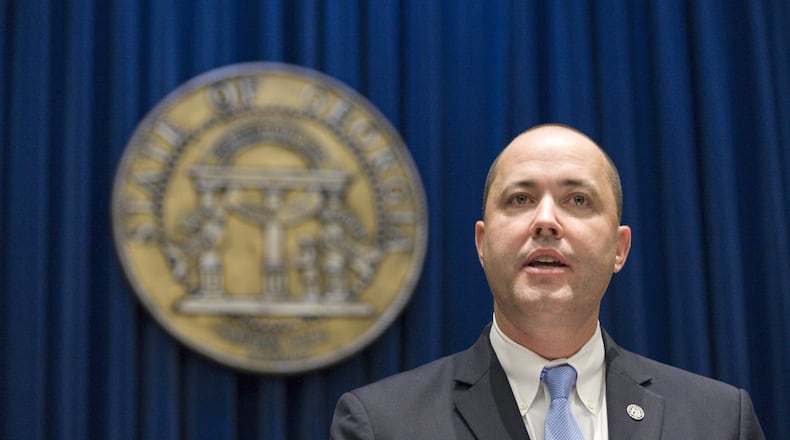In the blitz of Donald Trump’s attempts to overturn his election defeat in Georgia, one call the then-president made to a high-ranking state official has received relatively little scrutiny from investigators – until now.
The Justice Department’s four-count indictment against Trump, which charged him with plotting to “remain in power” despite his loss, included a reference to the Dec. 8, 2020 call he made to Attorney General Chris Carr.
Trump called Carr to “pressure him to support an election lawsuit” that was pending in the U.S. Supreme Court, the indictment said. That referred to a doomed lawsuit filed by Texas Attorney General Ken Paxton that sought to toss out the election results in Georgia and other key states.
The call earned media attention at the time, but it was overshadowed by other Trump’s other efforts to undermine President Joe Biden’s narrow victory in Georgia, including his demand that Secretary of State Brad Raffensperger “find” enough votes to reverse his defeat, and his plea to Gov. Brian Kemp to call a special legislative session to overturn the election results.
It call was among dozens of mentions of Georgia in an indictment that accuses Trump of committing conspiracies to defraud the U.S., to obstruct a government proceeding and deprive people of civil rights.
Credit: Greg Bluestein
Credit: Greg Bluestein
Special counsel Jack Smith’s staffers contacted Carr, who agreed to speak to an attorney in his office, according to his spokeswoman. She said Carr didn’t testify before the federal grand jury.
Trump contacted Carr, a Republican who had endorsed his reelection bid, shortly after the Georgian issued a statement that panned the Texas lawsuit as “constitutionally, legally and factually wrong.”
The two men spoke at the urging of then-U.S. Sen. David Perdue, who was locked in a close runoff battle against Democrat Jon Ossoff and eager to stay in Trump’s good graces. Perdue had received calls from Trump about Carr’s stance on the lawsuit, and he described the president as “furious,” according to several people at the time.
Carr told Perdue that he was just answering questions from other attorneys general around the nation and not actively pushing them to reject the lawsuit, as he had done in Georgia. He agreed to talk to the president if Perdue thought it would help.
Credit: Arvin Temkar/AJC
Credit: Arvin Temkar/AJC
Trump’s secretary reached Carr around 6:30 that evening, while Carr’s wife and teenage daughter were settling down to watch the movie “Elf” at their Dunwoody home.
After about 90 minutes of waiting, Trump finally got on the line as Carr paced around their home. He repeated to Trump what he had told Perdue – that he wasn’t telling other officials whether to join the lawsuit but that he was fielding their questions.
In the charging document, prosecutors said Carr told Trump “that officials had investigated various claims of election fraud in the state and were not seeing evidence to support them.” That echoed the pushback from Kemp, Raffensperger and other GOP officials pressed by Trump to overturn his defeat.
After the call ended, Carr immediately called Perdue back. “I think it went well,” he told the senator, who chuckled before reminding his ally how unpredictable Trump can be.
“I’ve had calls with the president where I thought it went well and it didn’t, and I’ve had calls with the president where I thought it didn’t go well and it did,” Perdue said.
Minutes after Trump and Carr hung up, Perdue and then-U.S. Sen. Kelly Loeffler issued a joint statement proclaiming their support for the Paxton lawsuit.
“This isn’t hard and it isn’t partisan. It’s American,” the senators said. “No one should ever have to question the integrity of our elections system and the credibility of its outcomes.”
Carr, meanwhile, soon found himself on Trump’s bad side. The former president betrayed his former ally ahead of last year’s Republican primary and instead endorsed attorney John Gordon, who staked his far-right challenge on Trump’s election fraud lies.
Carr trounced him in the primary and defeated Democrat Jen Jordan in November. He now plans to run for governor in 2026 to succeed Gov. Brian Kemp, who also walloped Trump’s handpicked Republican challenger.
About the Author
Keep Reading
The Latest
Featured





